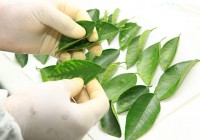28
jul
Special glasses identify citrus greening symptoms categories: Greening, technology

The product was developed by Embrapa Instrumentation in partnership with the Federal University of São Carlos (UFSCAR).
A pair of eyeglasses with lenses coated with a special filter is the newest invention to detect the symptoms of huanglongbing (HLB), also known as citrus greening, during visual inspection in citrus groves. The innovation, which is already available in the market, allows the user to see the main characteristic of the disease, known as leaf mottling or yellowing, because it intensifies the contrast between green and yellow, which is typical of the pest.
The glasses were developed by Embrapa Instrumentation and the Federal University of São Carlos (UFSCAR), and makes it easier for inspectors to work, reducing the error rate in the identification of the disease, and bring visual protection to users. The creators believe that in addition to Brazil, the technology could be used by inspectors in other citrus-producing countries, such as the United States, China, Mexico, Spain and India.
Using the traditional method, citrus greening can be identified through visual inspection by trained professionals, but with high failure rates. It is believed that half of the symptomatic plants are kept in the field because of errors in the inspection, which allows the disease to proliferate among healthy trees.
The technology, already patented, is available at Fhocus Optical Solutions, a company licensed to manufacture and trade the eyeglasses, based in São Carlos (state of São Paulo), and with a branch in São Paulo, and it can be acquired by prior registration at the company’s website or phone number.
According to Fhocus’ marketing director, Mr. Clédio Romero Rodriguez, the unit cost of the eyeglasses is estimated at around R$200.00, but can be reduced depending on the purchase amount. Mr. Rodrigues recalls that the technology is being developed according to the strict requirements of the American National Standards Institute (Ansi), and he believes that the product should be consolidated as an innovative working tool to help reduce the contamination of orange groves.
Source: Página Rural
- |
